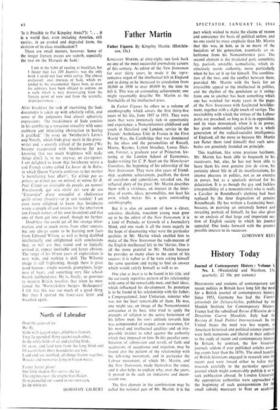Father Martin
KINGSLEY MARTIN, at sixty-eight, can look back on one of the most successful journalistic careers of this century. As editor of the New Statesman for over thirty years, he made it the repre- sentative organ of the intellectual left in England and in doing so he increased its circulation from 10,000 in 1930 to over 80,000 by the time he left it. This was an astounding achievement; one might reasonably describe Mr. Martin as the Northcliffe of the intellectual press.
In Father Figures he offers us a volume of autobiography which covers the first thirty-five years of his life, from 1897 to 1931. They were years that were immensely rich in opportunity and experience; a Nonconformist childhood and youth in Hereford and London, service in the Friends' Ambulance Unit in France in the First World War, the Cambridge that was dominated by the ideas and the personalities of Russell, Moore, Keynes, Lytton Strachey, Lowes Dick- son, Forster, a graduate year at Princeton, lec- turing at the London School of Economics, leader-writing for C. P. Scott on the Manchester Guardian, the beginning of his editorship of the New Statesman. They were also years of friend- ship, academic achievement, pacifism, the dawn of socialism and agnosticism, retarded sex, the reflected glory of the great; Mr. Martin describes them with a vividness, an interest in the inter- play of events, ideas, personalities, not least his own, which makes this a quite outstanding autobiography.
But it is also an account of how a clever, sensitive, idealistic, truculent young man grew up to be the editor of the New Statesman; it is a kind of Prelude, or Growth of a Journalist's Mind, and one reads it all the more eagerly in the hope of discovering what were the particular qualities in Mr. Martin which enabled him to make of the New Statesman the vade-mecum of the English intellectual left in the 'thirties. One is all the more grateful to Mr. Martin because he provides so many clues to the secret of his success; it is rather as if he were asking himself the same question and trying to find an answer which would satisfy himself as well as us.
One clue at least is to be found in his title, and the curiously repetitive pattern of his relationship with some of the remarkable men, and their ideas, which influenced his development. Its prototype is to be found in his relationship with his father, a Congregational, later Unitarian, minister who was not the least remarkable of them. He was, one might say, an image of the Nonconformist conscience at its best, who tried to apply the precepts of religion to the active betterment of his fellow men; his son's attitude towards him was compounded of respect, even reverence, for his moral and intellectual qualities and an irre- pressible instinct to rebel against the authority which they imposed on him. In this peculiar com- bination of submission and revolt, of faith and scepticism, of acceptance and rejection, may be found also the pattern of the relationship with the left-wing movement, and in particular the Labour movement, of which Mr. Martin, and the New Statesman, made themselves the voice, and it also helps to explain why, over the years, it proved to be such an indecisive and incon- sistent one.
The first element in the combination may be called the rational part of Mr. Martin; it is the part which wished to make the claims of reason and conscience the basis of political action, and no one could be more emphatic than Mr. Martin that this was, in him, as in so many of the Socialists of his generation, essentially an in- heritance from his Nonconformist past. The second element is the irrational part, something fey, puckish, unstable, iconoclastic, which in- stinctively resists authority, more particularly when he has set it up for himself. The combina- tion of the two, and the conflict between them, provided Mr. Martin with the basis for an irresistible appeal to the intellectual in politics, and the rhythm of the pendulum as it swings from one to another has been something which one has watched for many years in the pages of the New Statesman with fascinated bewilder- ment, together with a slight touch of vertigo. The inevitability with which the virtues of the Labour party are preached, so long as it is in opposition, and its vices denounced, when it is in power, has given unbounded satisfaction to a whole generation of the radical-socialist intelligentsia of England, all the more so because Mr. Martin can flatter them (and himself) that such acro- batics are genuinely founded on principle.
This tradition, like some precious heirloom, Mr. Martin has been able to bequeath to his successors, but, alas, he has not been able to leave them his own genuine joie de vivre, his curiosity about life in all its manifestations, his intense pleasure in politics, not as an exercise in power, but as a spectacle devised for his delectation. It is as though the gay and feckless irresponsibility of a nonconformist who is really a Cavalier in Roundhead's clothing had been replaced by the dour dogmatism of genuine Roundheads. He has written a fascinating book. because, in painting an extremely honest and revealing portrait of himself, he has also given us an analysis of that large and important sec- tion of English society to which his journal appealed. One looks forward with the greatest possible interest to its successor.
GORONWY REES


































 Previous page
Previous page